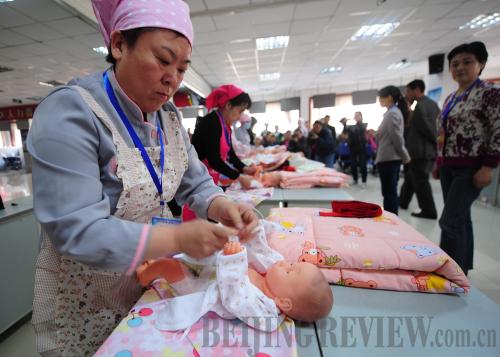|
 |
|
SKILLS TEST: A total of 121 yuesao take part in a professional skills competition in Guancheng District, Lanzhou City, northwest China's Gansu Province, on April 18, 2012 (ZHANG MENG) |
"However, this group is familiar with the Internet," he said. "It meets their needs in searching for information, exchanging and sharing experience, and also recording the lives of their newborns by writing diaries or uploading photos and video clips."
Emerging social media platforms such as twitter-like Weibo can also be an important tool for new mothers.
Jin Beibei, 31, created her Weibo account in October 2010 and has nearly 700 followers. She updated her status right after giving birth to her son in April last year. "I am so proud of becoming a mother. For me, posting on Weibo during yuezi is an emotional release," Jin said. "What really matters is sharing."
Wang Jing, Jin's classmate in high school, echoed her view. Besides providing updates on her newborn's progress, Wang also wrote reviews mother-and-baby products during yuezi. "To be honest, I didn't care much about the rules like no TV or Internet to keep radiation away," she said. "Reading and updating Weibo posts are part of my life."
Via Weibo, Wang has also kept up to date with a obstetrician at Peking Union Medical College Hospital named Zhang Rongya, who has nearly 1 million followers.
Wang learnt a lot from Zhang's posts. The "no bath or teeth brushing rule," according to the doctor, only came about when hygiene conditions were not guaranteed in old times. In fact, new moms are encouraged to shower as long as she stays warm.
"It is one of my major sources for yuezi-related information," said Wang, who gave birth to a son in September last year. "Plus, I'm willing to share the awesome stuff I used since pregnancy with more moms-to-be."
Helping hands
Traditionally, family members take care of mothers and their newborns during yuezi. But in recent years, more and more young parents prefer to hire a yuesao or "confinement lady" for assistance.
A yuesao, aged between 30 and 60, usually stay with new moms throughout the yuezi period. Unlike nannies, a yuesao provides postnatal care, teaches and assists parents with feeding, nursery set up and sleep. A yuesao can either work 8 to 9 hours during daytime or be on duty 24/7. In Beijing, some 50 domestic worker agencies have over 10,000 contracted yuesao. The monthly salary for a mid-level yuesao increased from 500 yuan ($60) in 2001 to 5,000 yuan ($770) in 2011.
"I think my job is meaningful. I'm more than a nanny. I'm a family helper," said Liu Dongxia, 56, a certified yuesao.
Coming from Laishui County, north China's Hebei Province, Liu worked on a farm before taking a two-month yuesao training course in July 2010 when the profession became popular across the country.
"I have two children, which means I experienced yuezi twice. But what I learnt from the course renewed my knowledge," she told Beijing Review.
Besides theory on nursing and postnatal care, Liu, who is serving her fifth family, was also required to learn basic psychology in order to cope with possible postnatal depression.
"Today, it is not all about rules and taboos, but a philosophy that focuses on a new mom's health, both physically and mentally," she noted.
Similar to yuesao, yuezi centers, aimed at high-end clients, have also emerged in recent years. In Beijing, a monthly package, including an individual room with a king-size bed, daily mother-and-baby care, massages and SPA, swimming as well as set meals, can cost between 50,000 yuan ($7,800) to 280,000 yuan ($44,000).
"Yuezi is not a matter of physical condition, but of perception," wrote Dr. Zhang in an article published on the Chinese website of the Financial Times. "Based on my own experience during yuezi, I prefer to absorb the essence of both cultures while leaving ridiculous rules behind."
Lu, who gave birth to a girl last September, agrees with Zhang. "Before delivery, my Western colleagues asked about my plans for yuezi. I told them I hired a yuesao and would follow the rules with a critical eye," she told Beijing Review. "Everything worked out just fine and I realized yuezi is not the great mystery I had thought it to be."
Email us at: chenran@bjreview.com |
